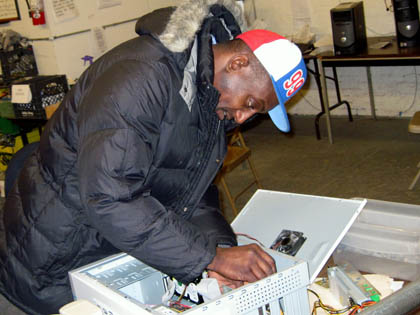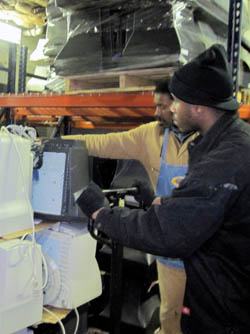
In partnership with Temple University’s Multimedia Urban Reporting Lab, the university’s capstone journalism class, students Chelsea Leposa and Jared Pass will cover neighborhood technology issues for Technically Philly and Philadelphia Neighborhoods through May.
Disclosure: NTR is a Technically Philly advertiser, though this post was not part of any advertising package and was reported by non TP-staffers.
Lorenda Legions was referred to Nonprofit Technology Resources Tech-Redi program in 2008, and three months later she was a full-time employee.
“It’s a wonderful program, I learned a lot,” Legions says with a smile.
Legions, like other Tech-Redi workers, was placed in the warehouse stacked-full with palettes of computer monitors, hard-drives and motherboards. She had no idea what any of the parts were used for, but that soon changed.
NTR, located on at 16th and Brandywine streets in the Fairmount section, helps welfare recipients gain useful computer and technology skills. Workers learn to identify components, manage inventory, and assemble, refurbish and repair computers.
“It’s a very rewarding program,” Legions says. “If you come in with the right attitude and mindset you can really excel.”
The program has two components. Workers spend 60 percent of their time in the warehouse, factory and store, and the rest of their time learning how to use the computers.
“Most that start the program know little about computers,” Stanley Pokras, the program’s executive director says.

However, throughout the program, workers learn basic Microsoft Office skills as well as more advanced programs. Workers even have the opportunity to get certifications for computer technology: A+ and Internet and Computing Core Certification, or IC3.
“IC3 certification lets a prospective employer realize that you have the expertise to utilize a computer,” said Charles Voegtle, the Tech-Redi advanced programs instructor. A+ is an entry-level certification that lets the industry know you’re capable of repairing computers and working with software and hardware problems.
“When students first come to NTR they are put through an initial 12-week Microsoft Digital Literacy Certification program as well as learn the basics of computer repair,” Voegtle says. If students are able to pass the certification program before 12 weeks, they can move on to IC3 and eventually A+.
Oliver Crenshaw, who has been a Tech-Redi for six weeks, says “I’m familiar with computers, but I never got around to getting my A+, so it was a great opportunity for me to earn it.” Crenshaw currently has 23 weeks left to complete the five-month-long A+ certification process.
NTR also offers GED assistance to workers who come into the program without a diploma. According to the Tech-Redi computer software and literacy instructor, Brian Lancaster, It’s paramount they get their GED. Students who need to get their GEDs can start pretty low, sometimes as low as a third-grade level. “Not having a GED only limits the job prospects workers can get,” Lancaster says. Two students have earned their GEDs with Lancaster’s assistance, and he is currently helping three more.
Tech-Redis also spend over half of their time in the program learning the process of computer repair through the warehouse, repair shop and computer thrift store.
Darryl Harris, a new Tech-Redi, said, “I’ve learned how to take computers apart and put them back together, I’m picking up on my typing skills, and I’m learning a lot.”
According to the Tech-Redi program director, Peter Kiliani, They come in and get oriented on how we place parts in inventory, put an inventory tag on each machine, and how we put all the data about the machine in inventory. They get an idea of what an inventory management system is like.
As well, Tech-Redis learn how to dismantle, recycle and identify various computer parts all in the first week. According to Kiliani, in following weeks workers learn to test the computer parts, install software, perform quality control inspections, prepare computers for refurbishing and configure a machine for use.
See a video of the Nonprofit Technology Resources facility. Story continues below…
[viddler id-c7d9aaf6 h-357 w-420]
“Then we’ll put them to work in repair shop,” Kiliani says. In the repair shop, Tech-Redis get to apply the skills they’ve learned. “They make sure every component of the machine works, then it’s ready to go to some lucky user,” Kiliani adds.
The computers that Tech-Redis repair are donated from individuals and businesses. “We are here Monday to Thursday, 9 a.m. to 3 p.m., accepting computers for donation. We get calls and go out to pick up donations from companies that have 10 or more identical Pentium 4 computers,” says Pokras.
After the donated computers are repaired by Tech-Redis, they are distributed in one of three ways. NTR’s Learning Through Technology program, which gives refurbished computers to low-income families, is one destination for the computers.
Also, Tech-Redis have the opportunity to build their own computers to take home with them at the end of the program. Crystal Davalos, a new Tech-Redi, doesn’t have a computer at home, but is looking forward to building her own. “It’s one of the last stages of the program,” she says.
The remaining computers are sold at very affordable prices to the community through NTR’s Computer Thrift Store. The store also sells refurbished hard drives, monitors, printing supplies and cables as well as other computer accessories.
“It really fills a void and an itch in the community, especially for low-income families,” says Crenshaw.
NTR’s Tech-Redi program benefits the community and local businesses alike, but it is in jeopardy. NTR’s two-year state grant for the program ends in June.
“We are seeking additional funding from other sources to continue the program,” said Pokras. “We are looking to become a contractor for the state or a training program.” If funding for the Tech-Redi program doesn’t come through, NTR would revert back to what it was before the program began: a repair factory and a store.
“I don’t know where I’d be if I didn’t come to the Tech-Redi program,” said Legions.
Join our growing Slack community
Join 5,000 tech professionals and entrepreneurs in our community Slack today!
Donate to the Journalism Fund
Your support powers our independent journalism. Unlike most business-media outlets, we don’t have a paywall. Instead, we count on your personal and organizational contributions.

Half of Pennsylvania’s federal buildings are set to be sold under Trump admin plan

RealLIST Startups 2025: Meet 20 Philly startups hot on the track to success

Biotech startups are still winning federal grants, accelerator founder says — but the money is taking longer to trickle in
